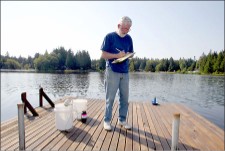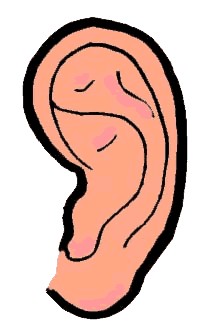Life at the Lake
a diary of living at a small lowland lakeWHAT IT'S LIKE

Early moonrise over Lake Ketchum
|
Archive Search |
| Links |
|
and s-integrator |

Sumi approximation of a haiku thought
We haven't forgotten haiku, have we? I mean, I haven't. Don't you.
Roughly speaking (and it is best not to speak roughly when you are speaking of haiku), there are two kinds. The "true" that scan in the Western syllabic manner, five-seven-five, and the "spiritual" that attempt to catch the essence of the haiku thought or attitude, and scan in no way at all.
An example of the first kind is this fine translation of Basho by Sam Hamill:
"How many rising
clouds collapse and fall on
this moonlit mountain"
Though it scans perfectly, it contains English alliteration and enjambments, which definitely are not in the manner of Japanese haiku. Otherwise quite tight and beautiful.
Now an original one by Jack Kerouac (from a letter to Gary Snyder):
"It is raining—
I guess I'll make
Some tea."
Simple, direct, comprised of three lines, but doesn't scan. Yet it nicely catches the essence of Japanese haiku and indicates that Ginsberg, Snyder, and Kerouac were well into the poetical form and liked what they saw and heard there. Or at least the last two mentioned did.
More anon.
- - Comments ()
...

If you won't go to the city, sometimes the city will come to you.
Photo courtesy Gilbert Arias and the Seattle PI
Picture is of meself, taking a measurement from the end of my dock for a reporter and a photographer from the endangered Seattle PI.
Why this?
Well, Jennifer Langston was assigned the job of doing a feature article on Snohomish County's lakes program, which features volunteer monitors, and because Lake Ketchum is so badly contaminated by weed and algae as the result of decades of a dairy farm's effluent draining into the lake, it sounded to Jennifer like a natural story.
So she phoned me, and I agreed to be interviewed in person the next day. After all, I had worked, however briefly, for the PI, and still looked on it with affection and respect. A good read and lively, too.
Jennifer turned out to be a young, slender, attractive, intense, personable woman, and I liked her. I was impressed by the kinds of questions she asked and her note-taking prowess; when the article appeared on Monday, September 8, I found she had not missed a beat in regard to the monitoring process and what I measured for the county's State of the Lakes report to Ecology and EPA, which requires such a volume of statistics because of a federal law.
The idea nationally is to have all the lakes in the country meet clean water, or drinking water, standards. I agree, it is impossible. But what a goal!
Jennifer was surprised that a lake with such a bad reputation looked so good. There was practically no weed, as a result of a single herbicide treatment, and the algae, both green and blue/green (a bacterium, incidentally) were in low measure. But the lake had turned dark brown, probably from dying green algae, in the past few days, and I was at a loss to explain the condition, while I took my measurements and went through a "dry run" of what I would do, two weeks hence, to measure dissolved oxygen, chlorophyll, and phosphorous both shallow and deep. The DO is vital to all fish and underwater life, such as crustaceans and insects.
Despite low DO readings two weeks earlier, I was still finding snails and there were midges hatching out nightly. I had caught a trout the day before (and one that night, after the interviewers were gone: one being my limit and always released), and it was fat and feisty, though no bigger than eleven inches, a low average for late summer.
I told Jennifer this, and noticed that Photographer Gilbert Arias perked up his ears. It would have been impossible not to have identified him as a newspaper photographer, for an immense digital Nikon camera hung heavily from his neck, and his shoulders also bore bags housing equipment. He was bearded, heavy-set, and most attentive, looking for a good picture. He snapped away, as I prattled on about the lake and its contents and its problems, showing off my equipment. But now we began talking fish—fish talk.
Jennifer tried not to yawn. Gilbert and I both noticed this, but jawed on. He was a bass and steelhead fisher, he said. So was I, I said with faked wonder.
It was nearing noon, and their departure time, for this small assignment was not supposed to take up the whole day, and she had Elsie Sorgenfrei to interview at Lake Rossiger. It was a much bigger lake and not nearby. I had been a lake monitor for five years; Elsie for 17.
Rossiger is in much better shape, but still requires close watch to keep it that way. So, with a second handshake from her small firm hand, Jennifer and I parted company. I was surprised when the article came out and at its huge picture. Hey, I looked pretty good.
Yesterday I read an article by her on a local zoning law conflict involving the county planning division, the county council, a car dealership, and local farmers protest. It was quite complex an issue, and I had trouble following some of it, but I was sure that Jennifer had it right and I could believe what I read.
That's what lies at the heart of reporting.
- - Comments ()
...

Spider at my window is a sure sign of autumn
It is autumn—I don't care what the calendar says. It's autumn because the skies are cloudy and, for the first time in about 90 days, some measurable rain has fallen. Correction: is falling.
And I welcome it. Nothing more intrinsic to the Pacific Northwest than longed-for rain. It's not a torrent, not steady rain, but last night's Mariners game was delayed (I thought) because of a rain-caused power failure. Turns out it was because a truck hit a power pole, but wasn't the truck accident caused by rain-slick pavement and an accumulation of motor oil on the industrial streets?
Meanwhile, the same storm rolling in from the Southwest blackened the skies, hastened the wind, and caused a disturbance on my TV dish that made the baseball game pop and crackle alarmingly, the picture pixelize into jagged-edged fragments, and for long moments totally disappear. And this before the 34-minute power failure at Safeco Stadium that left about 40,000 fans holding hands, or whatever, in the near dark.
The pitcher had to warm up all over again.
The game announcers—who between them have seen about one zillion games played—had to ad lib, which translates "reminisce." One ex-player said he remembered a game where the pitcher wound up, threw the ball, and the field went dark.
The batter—terrified of being hit, or beaned, as they call it—dropped flat and stayed there till the lights came back on.
Me? I popped a tape of a movie in my ready VCR. "The Bourne Identity," it turns out, is a formulaic high-tech good guy/bad guy thriller flick. It is highly entertaining, if you are not too critically inclined.
After a while I flicked back to the game, which had resumed several innings earlier, under bright lights, and saw Joel Pinero give up a shut out in the top of the ninth. Still it was a rare win.
Still, it was only a three-hitter and a win. The movie, I'd give one thumbs up—which is two less than three.
For three, you gotta find somebody to lend you a hand.
- - Comments ()
...

Technical rendering of the human ear, as done by a child
Reading on in Technoscout (see yesterday's blog), I run across this fascinating fact: "According to statistics from the Mayo Clinic, one-third of U. S. adults over the age of 65—and half of those over 75 are hearing-impaired. (Never mind the ungrammatical construction; the truth in advertising is what we are after.)
We are a nation rapidly growing—no euphemisms here—deaf. DEAF. And I subscribe to the theory and practice. I know I sure am. It's either that or else my wife's voice has begun to fail at an alarming rate.
And now she frequently shouts at me, I know not why. I remember the same situation with her father in old age, and how her mother had this annoying way of addressing him. To me—at 25—it seemed disrespectful, highly contemptuous. Now I hear the same note in her voice, and I say:
"You don't have to shout. My God, you sound just like your mother."
It is only the raised voice of someone who has been asked to repeat what she said for the tenth time within the hour. And there is indeed annoyance in her voice. Why shouldn't there be? In the same situation I would become annoyed even faster, and am sure I have, with other people in the past.
What Technoscout is trying to do is sell me a special telephone. Looks nice enough and I am sure it works just fine, but I've already got a telephone, got several, and all function perfectly well. What do I need with another?
For my left ear works and I can hear things over the line clearly, even though the woman who runs the hearing clinic down in the village tells me I have considerable loss in that ear, too. But in comparison, I tell her, it is sharp as a bell. Or sharp as a knife. Whatever.
So I hold the ordinary phone to my ordinary left ear and the speaker on the line cannot tell that I am deaf as a stone in the other, or so I suppose the speaker can't tell. And what if that person is over 65, over 75 (I am not!), and most likely as deaf (pronounced : deef) as I?
Why, we're like two blind people in Plato's cave—from an auditory standpoint, at least.
And who wants to hear the cosmic elephant coming down the track?
- - Comments ()
...

i-glassesTM HRV
In the bulk mail the other day comes a flyer from the good folks at Technoscout, promising another electronic innovation to enrich our lives and, incidentally, to isolate ourselves from the world, namely, Others.
"Watch Movies In the Privacy of Your Head," proclaims the heading. No matter what is going on around you—war, famine, family disputes, world disorder—you are ensure privacy. Another word for this is Complete Withdrawal. (Okay, that's two words, but they serve as one, because one is simply a modifier.)
"i-glassesTM HRV" it is called. and it is "designed for personal, private, portable video viewing. Cost? Marked down from $699, it is a mere $599. If you want a built-in DVD player, it'll cost you one grand. But who isn't willing to pay it for Complete Withdrawal? (Their words, not mine.)
I won't point out that Complete Withdrawal is Catatonic Schizophrenia. It approximates that condition in which space travelers are put into cylinders, drugged into deep sleep, fed through tubes, and sent to Mars, Jupiter, or even the Sun, for all they know.
They . . . sleep. Then they . . . awake. You can, too.
Next best thing to being dead.
- - Comments ()
...

Our President, George II, as he appeared on TV last night. A reporter, Michael Hedges, from the Houston Chronicle, reported that the President spoke in "sober tones."
Good thing, too, for to ask the people of the US for $86 billion more for post-war restoration of Iraq might seem the words of a drunk. We need such reassurance.
I went quickly to my online American Heritage Dictionary and found, sure enough, that the tertiary meaning of "sober" was the equivalent of "somber," that is, "plain or subdued." And the fourth meaning listed was "marked by seriousness, gravity, or solemnity of character or conduct."
So the reporter wasn't entirely wrong. The word could be forced into such an interpretation. But "habitually abstemious in the use of alcoholic beverages or drugs" is the first meaning, and the second is "not intoxicated," which is good to know, considering the President's self-acknowledged admission to misuse of alcohol in the past.
I'd hate to think he had been drinking and, like the rest of us, didn't feel the overpowering need for a drink until he had finished his speech, forming his version of The Truth of How Things Are, and attaching the price tag to achieving his goals.
- - Comments ()
...

Grumman Goose was Alaska's main means of transportation in the Fifties
I have a strong sense of community, and I wish I didn't, for it often leads me astray and sometimes even makes me enemies. That is why I wish I didn't have it.
I think I know where it comes from. Nearly fifty years ago I was in the Army, the effing Signal Corps, and they assigned me to an island in Alaska. I was the only soldier there and didn't have to wear my uniform.
I reported to a major hundreds of miles away, in Juneau. He told me he didn't want to hear from me, and to contact him only if I had a problem I couldn't solve. That was jake with me.
Also stuck on the island (which was highly idyllic and rarely had snow, but made up for it with copious rain) were representatives from three airlines (I lived in quarters provided by Pan Am and was fed by them.)
Also on the island were Ellis Airlines, a shuttle service of Grumman Gooses, a Coast Guard air detachment unit, the Civilian Air Authority (or some such), Pacific Northwest Airlines, Standard Oil, and an emigrant Indian tribe from Canada, who had been deeded most of the island.
I could pretty much do whatever I wanted, so long as I could keep all the communication systems working. And when they broke down, I was expected to fix them. Ha, ha. If not, I sent the unworking unit to Ketchikan by soonest air shuttle. I had spares and a new unit would be sent me by return air.
I was pretty much free, but had to maintain several telephone/teletype circuits at the Pan Am air terminal. My equipment was housed in the Coast Guard hangar on the edge of the field. I had to show up for every commercial flight in and out of the place.
The CG ran almost everything and conducted an admirable air/rescue service up and down the coast of Southwest Alaska. They were famous for saving people.
My point is, we all had to get along with each other, like each other or not. Our collective survival was pretty much at stake. So, if you didn't like someone, or he didn't like you, it was tough luck. The only way you could get off the island was if somebody flew you off. They couldn't say, No, but they could make things difficult. It was better to go along and get along.
I mention this because there are not many comparable situations in civilian life, or, if so, I haven't run into them. People don't have to get along, and some of them take pride in being able to tell somebody else where to go. (It usually isn't heaven.)
Around the lake there are periodic alterations. (Nice way of phrasing it, eh?) We are not as interdependent as I would like us to be. Some people are downright mean and perverse. (They think I am, too, I am sure.) So much of the enmity that exists world-wide is present here.
I try to get along. People are clannish, locked up in tight family units. Many here on the lake are retired; those who aren't are busy raising children. When you are busy raising children, they become your sole reason for existence. They are your life.
Sure, I exaggerate, but not by much. Families tend to be self-centered. It may not be necessary for survival, but they sure act like it is. There is no immediate threat to the family in our daily society, but I think it is the women, the mothers, who act as though there is. And it may be a natural extension of motherhood to gather the brood and hiss hostilely at the world outside your ken.
The men tend toward an outward joviality but really prefer to be left alone. They have their cars, their shops, their tools, to occupy them. Plus sports on TV. They are pretty much used to being subordinate in their families. The children come first, and Mother is in charge.
She is in charge of her husband, as well. It is a form of extreme domination for control-seeking persons, namely, women. Of course I exaggerate in order to make a point.
The lake is ordinarily a pleasant place to live and I wouldn't opt for any other. But, after a long hot summer, tempers are short. We all want to be in the same place (on the lake or shore) at the same time. It starts before the Fourth of July and persists until Labor Day, or shortly afterwards.
We are in a time of change. Last night, the first hard rain in more than three months fell. First time in about sixty days that the temperature didn't exceed seventy degrees.
Soon we will all be locked inside our houses by constant rain. We Northwesterners like it, that way. We will be no longer in each other's faces. And that is a benefit.
- - Comments ()
...